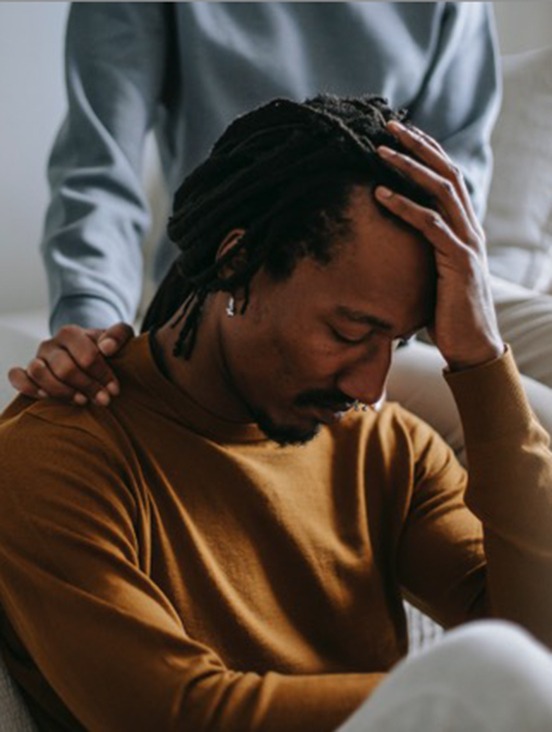
Has A Recent Loss Left You Confused And Directionless?

Are you struggling to recover from a recent loss?
Do you blame yourself or feel regret about what happened?
And are you finding it difficult to return to your “normal” life as daily tasks and responsibilities only overwhelm you further?
Loss has a way of putting our lives into perspective. Emotions take on a new weight, and a sense of urgency makes it difficult to make calm, thoughtful decisions. As one door closes, we may struggle to know which door to open next.
If your loss involves the death of a loved one or pet, you probably feel as though an essential element is missing from your life. Maybe the end didn’t go as you’d hoped, or you’re struggling to reconcile the suffering you witnessed. You may have developed extreme feelings of guilt, sadness, anger, and regret, wishing you could have just five more minutes with your loved one so you could let them know how you feel.
It’s possible that your loved one is alive yet faces a terminal diagnosis. You may already be grieving them, panicking about the amount of time you have left. Perhaps you are having a hard time making decisions surrounding logistics or end-of-life care. Especially if you live far away from them, you may feel guilty and too distracted to focus on daily responsibilities.
Perhaps Your Loss Involves A Loss Of A Job, Dream, Or Identity…
Death is not the only experience that perpetuates feelings of grief. Breakups, divorces, and job losses can also trigger grief-specific symptoms. Additionally, if certain circumstances have forced you to let go of a dream or vision you had for your life, you may feel as though you are missing a vital part of yourself.
Grief counseling applies to all matters of loss, including bereavement, job or identity loss, and the dissolution of a relationship. Working together with the Houston therapists at Unload It Therapy, you can feel supported in managing your grief as you chart a new path forward.

Loss Is A Difficult Yet Inevitable Aspect Of Life

There are very few mental health obstacles that everyone can relate to, but loss is one of them. All of us experience some form of loss sooner or later, as endings and death are an inescapable part of the human experience.
Grief—often taking the form of intense, prolonged sadness, anger, and regret—is a completely normal reaction to loss. However, there are many reasons why our culture is not very supportive of those in mourning. For one, we are very avoidant about the topic of death in general, with loss often being sugarcoated by the ideas that “everything happens for a reason” and that those who have passed away are “in a better place.” Even if we do ascribe to the concept of the afterlife, it does not change the fact that the pain of loss is still very real and valid.
Without a collective vocabulary or awareness surrounding death, it can be easy to think that something is wrong with us if we grieve intensely or for a long period. There is an unspoken expectation that grief has an expiration date and that staying strong is our responsibility in the face of loss. Especially if we are known as the “rock” or “anchor” for our families, giving ourselves permission to feel our emotions deeply and authentically can be difficult.
Counselors who specialize in grief and bereavement are experts in creating space. By fully exploring and understanding your emotions in therapy, you can give your grief the time and attention it needs to heal.
Grief Counseling At Unload It Therapy in Houston
If you are navigating a recent loss, many people in your life have likely been affected as well. As such, you may not have frequent opportunities to fully express your emotions or have the breathing room to get at the heart of what you are feeling. However, our therapists create a calm, personalized atmosphere where the only person you have to show up for is yourself. As you practice identifying and expressing your emotions, you will experience new growth and healing.
What To Expect

Grief counseling will move at your pace and according to your goals for therapy. Our early sessions are likely to center around normalizing your experience, explaining the effects that loss has on the psyche and giving you permission to feel deeply. Through this process, you will develop a newfound skill set and language for discussing emotions related to your loss.
From there, your Houston counselor will likely incorporate a range of therapeutic methods that are effective in treating the symptoms of anxiety, sadness, and post-traumatic stress that often accompany grief. Eye Movement Desensitization and Reprocessing (EMDR) can help target the trauma related to your experience, while Emotionally Focused Therapy (EFT) will help you to slow down and better understand your unique process of grieving. Finally, Narrative Therapy will help you to update your story in a way that both honors the loss you’ve experienced and paves the way for new possibilities.
You are not wrong to feel upset or even angry that you lost something that was important to you—your grief belongs to you, and your emotions deserve to be validated. Nevertheless, you don’t have to walk this journey alone. The therapists at Unload It Therapy can offer practical interventions for relieving some of the grief-related discomfort you feel. By facing your grief in counseling, you can meaningfully connect with yourself—and the person you’ve lost—in a way that will help you recalibrate your life in the midst of bereavement.

Still Not Sure If Grief Counseling Can Help You?
I thought grief only applied to matters of death and illness.
This is a common misconception, but any loss can trigger feelings of sadness, anger, guilt, and regret. Put simply, grief describes what happens when our lives become devoid of the people, pets, relationships, jobs, or ideas that give our life meaning.
No matter what your loss is, grief counseling can help you navigate and manage the pain.
Won’t a therapist just instruct me on “getting over” my grief?
No. Grief counselors are not interested in telling you how to feel or giving you quick fixes that might only make things worse in the long run. Instead, we are here to offer you individualized, consistent support during a painful transition in your life. We understand that there is no expiration on your grief, and we will never push you to move too far too quickly in therapy.
My grief has been affecting me for a while now—I am not sure that counseling can help.
Sometimes the most supportive aspect a therapist can offer is the validation that you don’t have to go through this alone. While we cannot take away your pain or bring back what has been lost, we can offer you concrete skills to help your pain feel a little more manageable. You are likely to find that the more you feel supported and seen in counseling, the less intense and isolating your grief feels from week to week.
Learn How To Move Forward While Honoring Your Loss
If you have recently suffered a loss, the therapists at Unload It Therapy are here to support you in navigating grief and bereavement. To find out more about how we can help.
From the Unload It Therapy Blog
Learn more about strengthening your relationships, building healthy communication skills, the importance of gender-affirming and culturally sensitive therapy, and more.
Anchoring Your Journey: How Therapy Nurtures Healing Through Each Stage of Grief
In this post we will delve into something that's often whispered about, sometimes questioned, and,...
The role of shame in grief
Grief is a complex and often difficult emotion to deal with. Shame can play a big role in how we...
How grief may show up in POC (People of Color)
Grief is our way of responding to loss, or any kind. Grief can be incredibly painful and...



